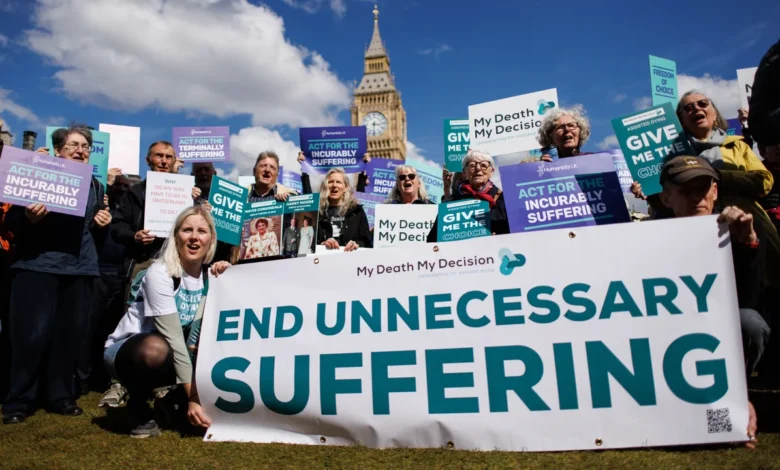
By Polly Toynbee, The Guardian.
Tory MPs opposed to this human right have been swept away. On Friday in the Lords, a path towards choice will finally be set
Every Labour government forges ahead with life-changing liberal reforms, and this one will be no exception. Expect the right to die to be one of this government’s landmarks, removing one of the last barriers to freedom over our own bodies. Everyone must die, but the greatest dread is exiting the world through a torture chamber. Once assured that we need never bear the unbearable, death would lose much of its sting.
While other countries allow the mortally ill to be released from the last stages of life if they wish, the British have been denied that choice, mainly by the power of religious lobbies. Only God can decide how long we should suffer before death comes at a time of his pitiless whim, they say. Humanists UK has tussled with them for years on this. Yet faith campaigners have defeated a change in the law time and again, despite religion being a fading preoccupation.
But on Friday, as Lord Falconer tables his private member’s bill on assisted dying for terminally ill adults in the Lords again, it’s almost certain to win. This is because be it his bill or a Commons bill, Keir Starmer will back it – and it requires his say-so, because private members’ bills need the grace of government time to get on to the statute book. (Yes, that is an unjust system that needs reform too.) The prime minister supported it in the 2015 Commons debate, and again this March, telling ITV: “I’m personally in favour of changing the law”. He has seen drawn-out suffering, with his mother’s illness and after his mother-in-law’s accident in 2020; and as director of public prosecutions he had to set the standard on whether to prosecute people assisting a right-to-die suicide.
What a good time to put down this marker. The Isle of Man this week passed its assisted dying bill into law. That follows Jersey, whose assembly members voted in favour in May. Fearing a tidal wave of suicide tourism from the UK, they added a minimum residency requirement.
In Westminster the bill will be a free vote, likely to pass due to a radically changed House of Commons: Tories swept away mainly by Labour and Liberal Democrat MPs is a good augury for all liberal causes. The campaign group Dignity in Dying counts the removal of at least 183 MPs who blocked it in the past. Polling the group commissioned also finds a public majority in favour in every single constituency and 75% nationally.
The bill will be hard fought, and arguments will be made that good care alone can promise an easeful death. Palliative care often can – hospices are havens of kindness and better places to die than an understaffed NHS hospital. But the brutal fact is that even the best care can’t stop some experiencing horrible last months of life.
If you can’t bear it, skip this paragraph, as I quote from the Inescapable Truth, research from palliative care professionals and relatives who have seen the worst: “Some will retch at the stench of their own body rotting. Some will vomit their own faeces. Some will suffocate, slowly, inexorably, over several days, their last moments of life disfigured by terror. Any one of us might suffer such a fate.” A nurse describes a woman with “tumours in her abdomen. It was basically dying flesh and she was still with us. Her family’s memory of her was her decomposing while she was still alive.” The report estimates 17 people a day die in unrelieved agony.
Understandable concerns include fears the law may cause some terminally ill people to be hastened to their end by greedy relatives, or an NHS eager to empty its beds of no-hope cases, as in the disregard for human life at Gosport hospital. But that slight risk, mitigated by strict safeguards, has to be weighed against the absolute certainty of the agony the current law inflicts on so many – and the fear of that agony for anyone given a terminal diagnosis.
Falconer’s bill will make it through the Lords, but it will go to the back of the queue in the Commons unless whips pull it up to the front. On 5 September, the Commons ballot for private members’ bills gives MPs who come top the chance to pick this up and finally pass it into law. This is destined to happen in Starmer’s time.
It will join the roll call of great liberal reforms that only happen under Labour. Let’s look back to the 1964 government: abortion and divorce reform, gay rights, the Race Relations Act and the Equal Opportunities Commission, ending the death penalty and flogging in prisons, decriminalising suicide, reform of obscenity laws and abolition of theatre censorship. In the chapter Is Britain Civilised? from his book The Labour Case, Roy Jenkins wrote, “Let us be on the side of those who want people to be free to live their own lives, to make their own mistakes, and to decide, in an adult way and provided they do not infringe the rights of others, the code by which they wish to live.”
When Labour was back in power in 1974, Barbara Castle gave us the Sex Discrimination Act 1975, and the Equal Pay Act 1975 that meant equal pay for work of equal value. Tony Blair’s legacy was civil partnerships in 2004, the crucial law giving same-sex couples equal next-of-kin and parental rights, alongside pension, social security, tenancy, inheritance and property rights. It was a life-changing legal watershed. David Cameron likes to take credit for same-sex marriage, but the Tories would never have done it had Labour not done the political heavy lifting of civil partnership first.
Just as I am certain this government will leave an even greater fall in child poverty than Blair and Gordon Brown achieved – how impatient those Labour MPs who voted for the SNP amendment are – it is certain that the right to die will be one of Starmer’s notable liberal reforms.





